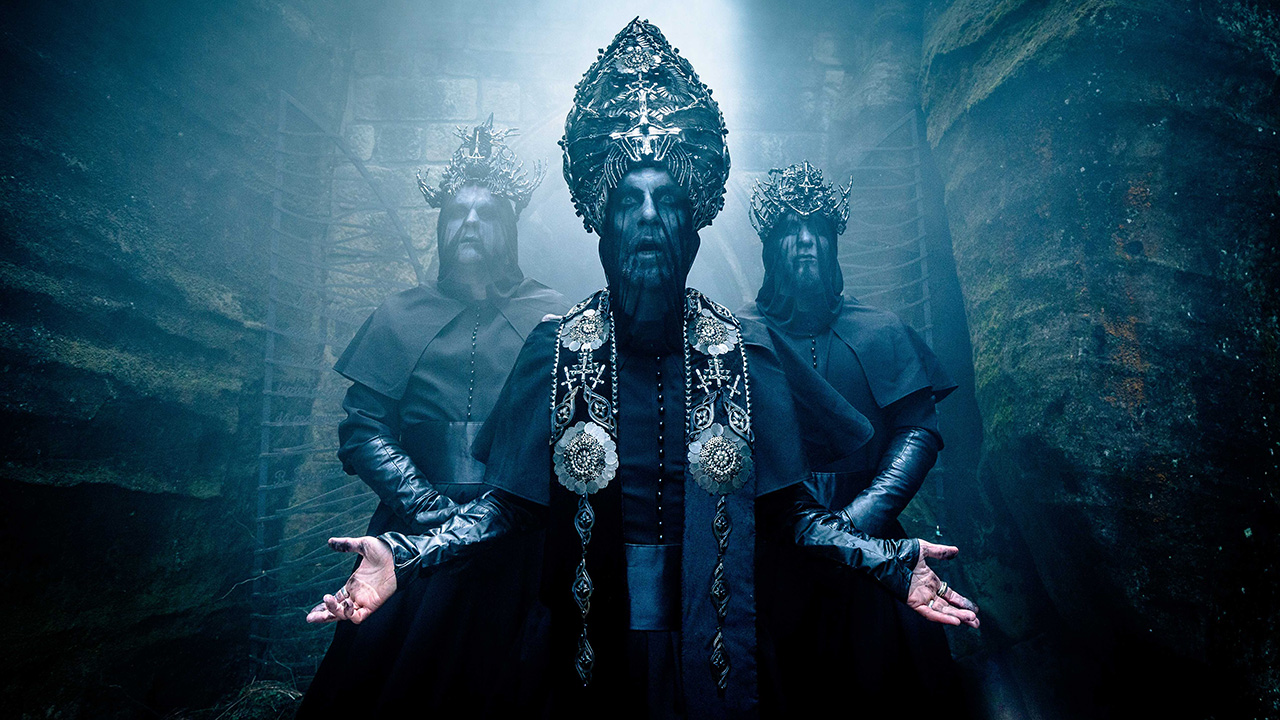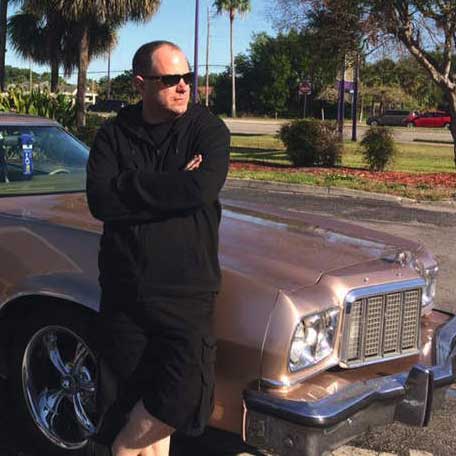Opinion: Why metal bands should still give religion the middle finger
Behemoth are back to their blaspheming ways again, and they should be praised for doing so

Select the newsletters you’d like to receive. Then, add your email to sign up.
You are now subscribed
Your newsletter sign-up was successful
Want to add more newsletters?

Every Friday
Louder
Louder’s weekly newsletter is jam-packed with the team’s personal highlights from the last seven days, including features, breaking news, reviews and tons of juicy exclusives from the world of alternative music.

Every Friday
Classic Rock
The Classic Rock newsletter is an essential read for the discerning rock fan. Every week we bring you the news, reviews and the very best features and interviews from our extensive archive. Written by rock fans for rock fans.

Every Friday
Metal Hammer
For the last four decades Metal Hammer has been the world’s greatest metal magazine. Created by metalheads for metalheads, ‘Hammer takes you behind the scenes, closer to the action, and nearer to the bands that you love the most.

Every Friday
Prog
The Prog newsletter brings you the very best of Prog Magazine and our website, every Friday. We'll deliver you the very latest news from the Prog universe, informative features and archive material from Prog’s impressive vault.
The new Behemoth God=Dog video dropped last week. Unsurprisingly, it features a relentless parade of deliberately provocative blaspheming imagery. It’s a familiar trope in heavy metal. Especially extreme metal. Notably Behemoth’s extreme metal. But isn’t this kind of thing a bit of a cliché? Hasn’t it been done to death? Haven’t we all accepted that the central tenets of monotheistic Judaeo-Christianity are oppressive and intolerant, and then quietly moved on? Don’t we have better things to worry about? Kids are being forced down mines to make mobile phones. The trafficking of women and children is the world’s fastest growing crime. The planet’s fucked. We’re all going to die. The President of the USA is a colossal bellend. Blasphemy, by comparison, is a dead duck. It has about as much relevance to 2018 as the Spanish Inquisition reforming as a Winger covers band.
Or does it?
It’s very easy to be cynical. When you live in a secular country. When you can say what you like when you like about pretty much anything. Including religion. Who is going to complain? Your local Church of England vicar? Your Catholic priest? Your Rabbi? Your Imam? It’s easy to take that freedom of speech for granted. Not everyone enjoys the same luxury.
Behemoth Archbishop Adam ‘Nergal’ Darski is a clever guy. He’s a qualified historian. He’s a TV celeb at home in Poland and appears on Poland’s version of The Voice as one of the singing coaches. He has a blues ’n’ country side project. For the past decade, he’s battled grassroots free speech. He ripped up a copy of the bible on stage in 2007 and was charged with blasphemy. He faced two years in chokey. His leukaemia also meant he faced a slow and painful death. He beat both. So maybe the video is more personal to him. Maybe it’s a reflection of his industrious work-rate at odds with his illness and pseudo-theocratic law.
Banging on about religion has a long and storied history in heavy metal. But is it really just about religion? Or is it about authority and intolerance in general? Religion is a convenient all-encompassing scapegoat. Fundamental Christianity is to heavy metal what Nazis are to Spielberg films. We hate those guys. They’re an easy target: all your hate in one easy digestible package. Authority. Being ordered around. Abuse. Lies. Blind devotion without explanation, logic or thought. Lame songs. Biblical nonsense. Historical atrocities. Stifled freedom. The lack of progressive thought. War. Terrorism. The utter baselessness of life. The hijacking of tolerance, compassion, understanding, and forgiving as Christian moralism when they’re in fact simply traits of basic human decency.
John Lennon predicted the demise of Christianity in 1966: “Christianity will go. It will vanish and shrink,” he said. “I needn’t argue about that; I know I’m right and I will be proved right. We’re more popular than Jesus now.” But even over 50 years ago, the most innocent quote could be twisted by anyone with an agenda; Lennon wasn’t stating that The Beatles per se were more popular than Jesus, he was stating that Christianity was dying out and that any modern popular culture touchstones – even TV for example – was more popular than Christianity. The Beatles received death threats, their records were burned across the bible belt and it effectively marked the end of their touring career. But the floodgates were open and the likes of Black Sabbath, Led Zeppelin and Deep Purple filled the post-hippie vacuum and heralded a new culture at odds with society’s deferral to organised religion. The bands either consciously flirted with Satanic metal imagery or were Satanic by the decree of others.
A decade after Lennon’s matter-of-fact statement, Crass founder Penny Rimbaud wrote Asylum. An anti-Christian poem, it was later used on the initial pressing of the 1978 debut Crass album, The Feeding Of The 5,000. Workers at the pressing plant refused to handle the record due to Asylum’s blasphemous nature. Later pressings of the album including Reality Asylum (its full title) were banned. The band were questioned under caution by the police. But listen to it now and you might wonder what all the fuss was about. It’s a posh woman swearing and suggesting Jesus was a bit of a cunt. Another decade and a bit later, the fellas in Cradle of Filth went one better and created rock’n’roll’s most notorious t-shirt. Dani Filth – no stranger to a bit of ambient marketing – produced a tee featuring a photo of a nun pleasuring herself with a cross. The text across the back of the t-shirt provocatively proclaimed JESUS IS A CUNT. Then five years later, they poured salt on the stigmata wounds by turning up to the Vatican for a guerrilla photoshoot and acted all surprised when His Holiness didn’t bring out his best crockery and the French Fancies.
Sign up below to get the latest from Metal Hammer, plus exclusive special offers, direct to your inbox!
Poor old Christianity, eh? It’s an easy target when its most militant activists are those WBC asshats exhibiting all the algorithmic intelligence of a photocopier. No one would be daft enough to judge all Christians by the WBC’s idiocy. But evidently, it’s OK for some of the west to judge all Muslims by the creed of the ISIL death cult. Don’t be that guy who whines that maybe Satanic metal bands should pick on Islam if they reckon they have balls. Islam is a minority religion in the UK, Europe and USA. Generally speaking, heavy metal fans didn’t grow up with being forced down the local Mosque and made to read the Koran.
But metal bands do have the balls. It’s not as if it’s confined to just Christianity. Metal bands are risking arrest, torture and abuse. Others are risking their lives for the right to free speech.
Should metal bands still be making blaspheming songs and videos? Until else everyone has the right to do it, yes – of course they should.
A regular contributor to Louder/Classic Rock and The Quietus, Burrows began his career in 1979 with a joke published in Whizzer & Chips. In the early 1990s he self-published a punk/comics zine, then later worked for Cycling Plus, Redline, MXUK, MP3, Computer Music, Metal Hammer and Classic Rock magazines. He co-wrote Anarchy In the UK: The Stories Behind the Anthems of Punk with the late, great Steven Wells and adapted gothic era literature into graphic novels. He also had a joke published in Viz. He currently works in creative solutions, lives in rural Oxfordshire and plays the drums badly.

